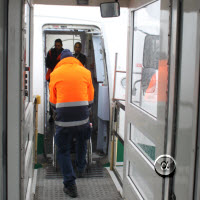Airlines Must Do Better To Facilitate Access To Aviation
- Written by Roberto Castiglioni
 We were in Avila, Spain, last week, participating to the IV International Congress of Tourism for All as expert external reviewers of a study on access to aviation.
We were in Avila, Spain, last week, participating to the IV International Congress of Tourism for All as expert external reviewers of a study on access to aviation.
Albeit interesting, the conclusions of the publicly funded study are limited and not technical, hence failing to address some of the core issues preventing access to air travel.
While presentations rarely allow exchanging valuable information, conference goers are well aware that coffee breaks frequently offer the best opportunity to debate and exchange formative opinions.
During one of such breaks we were asked why we invested time and energy to help passengers with special needs prepare for their flights. In particular, one person asked why we provide free assistance to passengers who require assistance when traveling by air.
The immediate answer to the first question is fairly simple; we like to think people can enjoy seamless journeys irrespective of their impairments, and therefore put our experience at their service. However, research and monitoring of how airlines and airports implement services for passengers with special needs is also extremely important to us.
It may come as surprise to some, but we learn far more from problems arising during travel preparations than from the analysis of a complaint following an unfortunate experience.
Why this service is free is also simple: people with special needs should not have to pay more to travel
by air because of their impairments.
At the beginning of June we followed the travel preparations of a family traveling long haul with a severely disabled child. For financial reasons, the family had chosen to purchase an indirect flight, meaning a flight that would have one stop between departure and arrival. Because of their choice, preparations were very important, as the family was scheduled to change aircraft during their layover at the intermediate airport.
The family booked assistance with the tools provided on the airline’s website, meaning they ticked the box requesting assistance for one passenger, their child. Most airlines ask passengers with special needs to call their phone support to discuss their needs; however, quite some carriers do not offer free phone numbers or call back services. The family was satisfied having requested assistance online, and did not call the special support phone number.
With their authorization, we contacted the airport were the family was to change aircraft. At this stage we learned that the wrong assistance code had been passed on by the airline to the airport.
Transmission of incorrect information, hence delivery of wrong assistance, is unfortunately still very common, and one of the issues most likely to cause a negative experience. In this case, we had the airport service provider correct the information, and were delighted to lean the family enjoyed a seamless journey. However, this example helped us focus on what solutions can be deployed to prevent such problems in the future.
In this respect, airlines must do more, and better, to remedy this problem. Airlines are the original
recipient of information from passengers in need of assistance. They have the legal obligation to collect, process, and transmit the information throughout the network of subjects called to provide support to the passenger who requires assistance.
Airlines are promoting sales of tickets from their websites. Some, like easyjet, recently introduced dropdown menus at the stage of assistance requests. These menus allow the passenger to detail the type of assistance required at the booking stage and generate the correct information format that is then passed on through the network.
Other airlines, like Air France, offer a “frequent flyer” card for passengers with special needs. The Saphir Card stores the passenger’s information and his/her needs for assistance. All the passenger needs to do is enter the card number at the time of booking, and the correct information will be generated and transmitted.
The above examples tell us that solutions are on hand; however, they also remind us of the need to identify and adopt a standard solution across the industry.
One of the success factors in the airline industry is management of turnaround times, the time it takes for an aircraft to get to the gate, offload and load cargo and passengers, refuel and take off again. Shorter turnarounds are essential to an airline’s overall profitability.
Availability of correct information allows airports to organize and deliver assistance to passengers with special needs in a timely manner, a contributing factor to better passenger journey and shorter turnaround. Positive brand management and operational efficiency should be incentives good enough to stimulate airlines do better to facilitate access to air travel.
About the author
Founder and Editor-in-Chief of Reduced Mobility Rights, Roberto Castiglioni is an expert of airport accessibility, management and support procedures of passengers with special needs and air travel related regulations. He has been a frequent flyer for the past three decades and has several years of experience as travelling partner of a passenger who requires assistance.
Roberto provides accessibility and access consulting services to airports and airlines. He is a member of the UK Civil Aviation Authority Access To Air Travel Working Group. He is also a member of the Easyjet Special Assistance Advisory Group. Esaag provides Easyjet with strategic guidance and practical advice on the evolving needs of passengers requiring special assistance.










